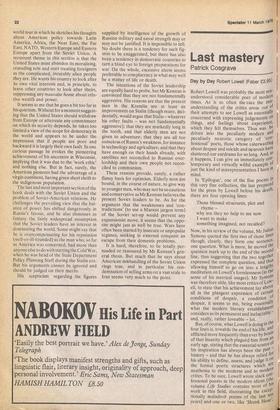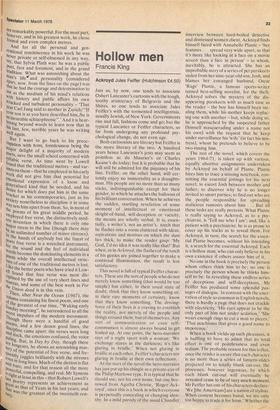Last mastery
Patrick Cosgrave
Day by Day Robert Lowell (Faber £3.95) Robert Lowell was probably the most mis' understood considerable poet of modern times. As is so often the case the rats: understanding of the critics arose out at their attempts to see Lowell as essentiallY concerned with expressing judgements °11 things, and feelings about experience, which they felt themselves. Thus was driven into the peculiarly modern agu peculiarly neurotic category of `c011. fessional' poets, those whose caterwauling about despair and suicide and neurosis have shattered our eardrums for so long. And, as it happens, I can give an immediately con: 'temporary and virtually wilful example °I just the kind of misrepresentation I have in mind. In 'Epilogue', one of the fine poems in this very fine collection, the last prepared for the press by Lowell before his death' there are four opening lines:
Those blessed structures, plot and rhyme — why are they no help to me now I want to make something imagined, not recalled?
Now, in his review of the volume, Mr Julia" Symons quoted the first two of those lines though, clearly, they form one sentence, one question. What is more, he moved the question mark up to the end of the second line, thus suggesting that the two together expressed the complete question, and thus allowing himself to go on into a lengthY meditation on Lowell's formlessness (in the sense of his metrical usages). Mr Sym0115 was therefore able, like most critics of Low' ell, to state that his achievement lay above all in the plangent expression of certain, conditions of despair, a condition °I despair, it seems to me, being essentially what the modern literary establishment considers as its permanent and ineluctable and, really, rather loveable — lot. But, of course, what Lowell is doing in thAe four lines is, towal.ds the end of his life, an" afflicted more frequently than ever by bouts of that insanity which plagued him from arlf early age, stating that the essential source 0 his inspiration has always been the past history — and that he has always relied f°' his ability to define, assess, and judge it oil the formal poetic structures which are anathema to the moderns and to modern • critics. To be sure, Lowell wrote slack confessional poems in the modern idiom (th.e, volume Life Studies contains most of work in this field, discounting the excer tionally maladroit poems of the last tel; years) and one or two, like 'Skunk Hour re remarkably powerful. For the most part, nowever, and in his greatest work, he chose formal and even complex metres.
And for all the personal and generational reminiscence in his work he was never private or self-obsessed in any way, say, that Sylvia Plath was: he was a public Poet, first and foremost, and in the grand I tradition. What was astonishing about the man's life'and personality (considered apart, now, from the lines on the page) was' that he had the courage and determination to use as the medium of his mind's relations with history and public affairs his own wracked and turbulent personality — 'That Year Carl Jung said to mother in Zurich/ "If Your son is as you have described him,/he is an incurable schizophrenic".' And it is hear fling beyond words to learn now that in 'IS last, few, terrible years he was writing Well again. But I want to go back to his preocetiPation with form, formlessness being the major delight of a majority of modern Poets, save the small school concerned with a,Yilabic verse. As time went by Lowell iound that the traditional metres — and variants on them —that he employed in his early work did not give him that potential for motional expression of a loose and ,generalised kind that he needed, and his ukasire for which does put him in the same 'racket as his contemporaries, just as his atlxierY nonetheless to discipline it in some ",ttY sets him apart from them. So, in most of :Re Poems of his great middle period, he 'IlliPloyed free verse, the distinctively modern invention in which there is only one Zajor stress to the line (though there may 1 an unlimited number of minor stresses). n the hands of anybody but the finest of poets free verse is a wretched instrument, 'Pr the sound and the feel of individual words become the dominating elements in a ti)(21ern while the overall intellectual strucit!re of one of the traditional metres is lost. ike the better poets who have tried it Lowe!' found that free verse was most diselPlined by the use of very short lines and sttanzas, and some of the best work in For Ile Union dead is in this vein.
{
, Then, after Near the Ocean (1967), the Of me containing his finest poem, and one suthe greatest of our time, "Waking early w ndaY morning", he surrendered to all the .rat impulses of the modern movement. n,s'tQugh there were a handful of good (71ems, and a few dozen good lines, the alseipline came apart: the verses were long pad slack, the emotions confused, the voice :ling. But, in Day by Day, though there tee longeurs, he shows an astonishing masa rY of the potential of free verse, and freelvuentlYjuggles brilliantly with the stresses iill long lines. Much of the diction is flat ,."01 bare, and for that reason all the more nyerful, compelling, and real. Mr Symons . ikNasrtight at least in this — that Robert Lowell's Lgi Poetry represents an achievement as the,,!t as that of Yeats n his last years; and ' Was the greatest of the twentieth cenkry.



































 Previous page
Previous page